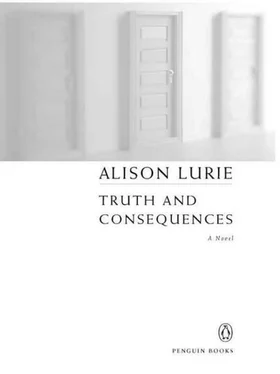Jane followed her to the kitchen, where they contemplated a gaping hole in the ceiling near the sink that exposed broken plaster, wires, and pipes, and a corresponding heap of debris on the floor below. “It was a couple of hours ago,” Susie explained, sneezing again. “I was in the office and I heard this awful noise, sort of like thunder, only indoors. The cleaners heard it too, so we all rushed in.”
“I see. You didn’t ask them to sweep up while they were here?”
“Uh-uh.” Susie sneezed again. “They wanted to, but I was scared. I thought, maybe there’s asbestos in that stuff. And maybe more of the ceiling is going to come down anytime. Like even now.” She gave Jane a panicky Chicken Little look and backed toward the door.
“I suppose it could,” Jane said. “Well, Buildings and Grounds should be able to tell us that. Let’s get out of here for now.” She shut the kitchen door firmly.
Sneezing violently, Susie followed her through the dining room into the wide, oak-paneled central hall. “I think maybe I ought to leave before my allergy gets worse,” she said when she could speak again.
“Yes, maybe that’s a good idea. It’s nearly four anyhow,” Jane told her. “I’ll call B and G, unless you did that already.”
Susie, sneezing more quietly and pathetically now, shook her head.
“Really,” Jane said, and might have said more, except that she had heard in her own voice a new, unpleasant tone that she recognized. Though she was still managing, just barely, to be patient and kind with Alan, she had ceased to be an automatically nice person. Often now it was as if all her suppressed impatient unkindness was in danger of slopping over into the rest of her life, onto innocent people like Susie.
She returned to the office and made the call, stressing the word “asbestos.” The B and G people usually went home at four o’clock, but the voice on the other end promised to try and send somebody over that afternoon to inspect the damage.
“Better not go in there again,” the voice ordered Jane, who, once she had hung up, immediately disobeyed. The consequences of the accident were beginning to appear in her mind, and she needed a cup of tea.
Jane was not sorry to have gotten rid of Susie, who would certainly have gone on sneezing, and also been made anxious by this disobedience. She only wished that she could get rid of Susie permanently. Though she liked her assistant personally, she deeply regretted having assigned her this job. She had been misled by Susie’s many good qualities: she was cheerful, accurate, and reliable; she was also quite pretty, something the Humanities Council had felt desirable in someone who would sit at the desk in the front hall of the Center and meet the public. When Susie had worked in the big Arts and Sciences office in Knight Hall it had not been apparent that she attracted problems, or that she was fearful of taking any initiative in solving them. She had been sociable and outgoing, and had many friends. But that had turned out to be a problem in itself. Susie had been happy in Knight Hall with her friends; the promotion in rank and raise in pay had not made their loss up to her, and she was lonely and unhappy at the Center. Moreover, recently she had quarreled with her boyfriend and become allergic to a wide range of substances. Jane had promised her a transfer back to Knight Hall as soon as a suitable job turned up, but so far there had been nothing that paid as well as this.
Carrying her tea in a mug with the Corinth crest on it, Jane returned to the Center office, a small sunny room with a white marble fireplace and blue Morris wallpaper, formerly the back parlor of the mansion. Built in the 1890s, this was a substantial brick house picturesquely covered in Virginia creeper, with an imposing entrance, bulging bay windows, and heavy dark Victorian furniture. Its large downstairs rooms were elaborately decorated and in continual demand for official lunches, dinners, receptions, and lectures. Permission to use these rooms was nominally in the gift of the Humanities Council; essentially Jane made the decisions, which added considerably to the respect she received from the various departments in the Arts College.
The standard procedure of the Matthew Unger Humanities Center was to invite a diverse group of Fellows, from different universities and fields, and to unite them by designating a yearly theme, thus encouraging interdisciplinary dialogue. This year the theme was “Structures of Faith,” and, as usual, there were three outside Fellows: a sociologist from India and Yale, an economist from Bosnia and the University of Ohio, and the famous writer Delia Delaney, the author of Womenfaith (spiritual essays), Dreamworks (poetry), and Moon Tales (modern fairy stories). There were also two Faculty Fellows: Jane’s husband Alan and a young literary theorist from Comparative Literature called Selma Schmidt. All of their projects had some relationship to the economic, social, or artistic aspects of religion.
Jane had already assigned the Fellows offices according to rank and reputation: Matthew Unger’s very large former bedroom had gone to Delia Delaney; and his wife’s only slightly smaller bedroom across the hall to Alan. The sociologist and the economist would occupy the other big rooms on the second floor, while Selma Schmidt would have to make do with a former sewing room next to the supply cupboard.
According to one of the senior administrators in Knight Hall, five Fellows automatically meant trouble, since about one professor out of five was always a real kook or a bastard or both. To Jane these statistics seemed exaggerated. The Fellows were usually very agreeable and accomplished people, well liked by their colleagues. Once in a while, of course, one of them was a disagreeable person whose colleagues wanted him or her out of the way for a while, so they could have a holiday from this person’s obnoxious behavior. It was true that each year at the Center somebody became a problem, but this was not always their own fault. Last winter, for instance, a well-known naturalist called Wilkie Walker, whom everybody liked, had slipped on the front steps one icy day and broken his leg.
Jane finished her tea and sat waiting for the man from Buildings and Grounds. Susie’s anxiety about future falls of plaster, she had realized, would probably be shared by B and G, which like all administrative offices was ever mindful of possible legal liability. It was very probable that once they saw the kitchen they would want to close it until a full structural inspection could be made. That could take a week or two, and meanwhile the room couldn’t be used, which meant that any University event involving more than minimal refreshments would have to be moved or rescheduled, including the Labor Day reception for incoming Fellows. For a moment Jane contemplated trying to convince them simply to cover the hole with a piece of drywall until it could be repaired; but a picture immediately came into her mind of heavy chunks of plaster and dust and drywall falling upon a group of catering students from the Hotel School, some of whom might be seriously injured or turn out to be the offspring of lawyers. Sighing, she took out the schedule for September and began to make a list of the people in various University departments whom she would have to phone on Monday, causing them irritation and inconvenience.
It was hot and stuffy in the Matthew Unger Center, which, unlike Knight Hall, was not air-conditioned. As time passed, Jane remembered that she had promised to stop at the drugstore on her way home and pick up a prescription and some grapefruit juice for Alan. She became more and more impatient to leave, and doubtful that anyone from Buildings and Grounds would appear. But shortly before five she heard the front door open, and a strong-looking man in his fifties, in jeans and a blue denim work shirt, carrying a clipboard, came in. He had curly dark hair and a friendly smile.
Читать дальше







![Кэмерон Доки - Правда и ее последствия[Truth and Consequences]](/books/79610/kemeron-doki-pravda-i-ee-posledstviya-truth-and-con-thumb.webp)




